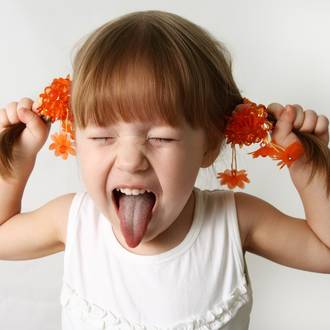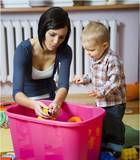Understanding disruptive behaviour
|
What constitutes ‘disruptive’ behaviour in young kids is very subjective. However, by looking deeper at your child’s behaviour it will help you understand more about why they act in a certain way. Behaviour that can appear ‘naughty’ or ‘disruptive’ to you, is often just your child’s way of communicating an unmet need as they try to figure out their way in the world.
|
You might also be interested in ...
Teaching empathy & compassion to preschoolers
Empathy is the precursor to compassion, and it’s only when we experience empathy that we can be compassionate. Parents are integral in teaching a culture of learning to respect others' feelings and helping young children to develop empathy.
Working together and managing behaviour
In our busy lives it often seems quicker and easier to give children instructions and replies of ‘Because I said so’ or ‘Do it now!’ However rewording your requests with phrases that show interest and promote involvement will encourage children to cooperate more. It helps children feel listened to, and in time they will start listening too.







However, by looking deeper at your kids behaviour it will help you understand more about why they act in a certain way.
Behaviour that can appear ‘naughty’ or ‘disruptive’ to you, is often just your kids way of communicating an unmet need as they try to figure out their way in the world.
Take time to understand what’s really behind their behaviour and actions with these simple tips.
Most often through your kids eyes it’s just innocent exploration and a quest for further knowledge.
8 Tips on understanding disruptive behaviour
1. The world from a child’s point of view
We often forget how it feels to be a child, instead judging their actions and words through an adult lens.
If we see the world from our child’s point of view it will help us to understand their actions and remind us of who our child truly is.
It is also important to remember that they aren't us – they have their own interests, views, desires, and personality that we need to honour.
Imagine how you appear and sound from your child’s point of view:
Being mindful of who your child is will help your to parent more considerately.
2. Actions can speak louder than words
Kids don’t or can’t always communicate with words, it is often with actions.
If they are getting fidgety, grumpy, or having a tantrum it may be that they need to go outside, run around or are really tired and need to have a sleep.
Or they may need quiet time or time alone. They may be feeling sad or upset about something and need to talk.
They may need to spend more time with you playing or reading, or helping you with what you’re doing.
Often disruptive behaviour is just a child's way of expressing an unmet need, so if you remain fully connected and present with your child you should be able to identify in advance when they are 'out of sorts' and respond accordingly.
3. Giving information, reasons & acceptable alternatives
If you child wants to do something you’d rather they didn’t, instead of saying no, try to offer acceptable alternatives to suit you both.
For example, if your child starts to draw on the walls, then an alternative to reprimand is to:
You may find out that they like standing up to draw or they like drawing big pictures and their paper is too small. They may then be just as happy to do chalk drawings in the backyard.
Showing them you are always on their side, trying to find ways for them to get to do what they want, will strengthen their trust in you and set you up as partners rather than adversaries.
4. Be a role model
We need to treat our kids with the same respect, courtesy and kindness we would an adult, and behave in the way we would like them to.
How often have you seen parents demand manners from their child that they don’t use themselves?
How often have you heard parents behave in ways they would reprimand their child for?
Kids are always learning, most of which they do from observation.
Progressive parenting means allowing them to develop these skills in their own time and in their own way; modelling the behaviour that we would like to see in our children.
5. Apologies
Apologies are immensely healing and cleansing.
If we apologise to our children, we show them we are human and capable of making and owning up to our mistakes, an attribute many of us would hope our children would acquire.
6. Drop expectations & value-judgements
We need to start seeing our child as the unique human being that they are – not an age or a gender or a label, but a person.
Kids can have intense feelings and needs and some are at times loud, curious, messy, wilful, impatient, demanding, creative, shy, confident and full of energy.
We must try not to judge their interests, passions or personalities.
If we don’t expect them to be doing certain things, in a certain way, on a certain schedule, we can begin to accept them as they are at that moment.
7. Be their hero
So often parents say negative things about their kids – sometimes right in front of them.
How often do you hear parents throwing around comments like, ‘Oh, I can’t wait until the holidays are over’, or ‘They are driving me nuts’.
We shouldn’t get drawn into verbal abuse, either in their presence or not. When we consider how we would feel if someone we loved was talking that way about us, it can make you see how painful this is for a child.
Saying nice things to and about our children, and standing up for them to others will make our child feel truly respected, loved and protected.
8. Positivity is contagious
Have you ever noticed that the more cranky you are with the kids the more cranky they get – and the vicious circle begins!
When times get tough and frustrating, it’s time to step back, take a breath and smile!
Really being with our kids; looking at them, getting down on the floor and playing with them, following their interests, and sharing ours with them, all help us to be able to put ourselves in a more positive frame of mind and restore peace.
More kids behaviour articles to enjoy
- Dealing with aggressive behaviour
- Learning to share
Image source: ladcblog.org